Neoliberalism's Impact on Government Climate Action: An In-depth Essay
VerifiedAdded on 2023/06/10
|7
|2546
|214
Essay
AI Summary
This essay examines the influence of neoliberalism on government actions to address the climate crisis. It argues that neoliberal policies, prioritizing free markets and limited government intervention, hinder effective climate action. The essay discusses how neoliberalism treats citizens as consumers, promotes competition over sustainability, and allows corporations to prioritize profits over environmental concerns. It highlights the hypocrisy of blaming individuals for pollution while ignoring corporate emissions and the challenges governments face in implementing climate policies due to social and economic divides exacerbated by neoliberalism. Furthermore, the essay explores the vicious cycle where governments support corporations with subsidies, undermining climate action efforts. It concludes that neoliberalism's dependence on fossil fuels and its reluctance to challenge corporate power significantly impede government efforts to combat the climate crisis.
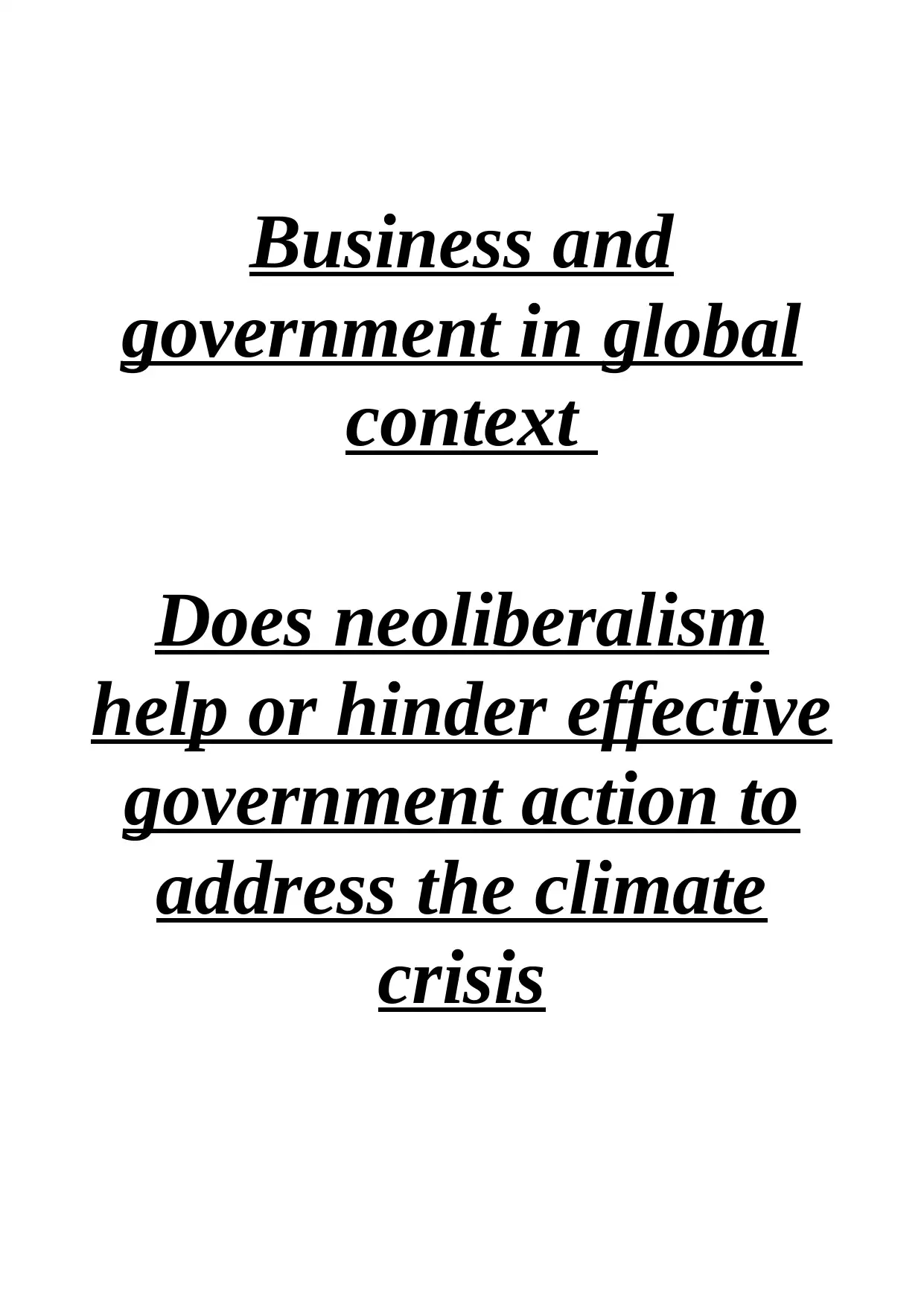
Business and
government in global
context
Does neoliberalism
help or hinder effective
government action to
address the climate
crisis
government in global
context
Does neoliberalism
help or hinder effective
government action to
address the climate
crisis
Secure Best Marks with AI Grader
Need help grading? Try our AI Grader for instant feedback on your assignments.

Table of Contents
INTRODUCTION................................................................................................................................3
MAIN BODY ......................................................................................................................................3
CONCLUSION ...................................................................................................................................6
REFERENCES ....................................................................................................................................7
INTRODUCTION................................................................................................................................3
MAIN BODY ......................................................................................................................................3
CONCLUSION ...................................................................................................................................6
REFERENCES ....................................................................................................................................7
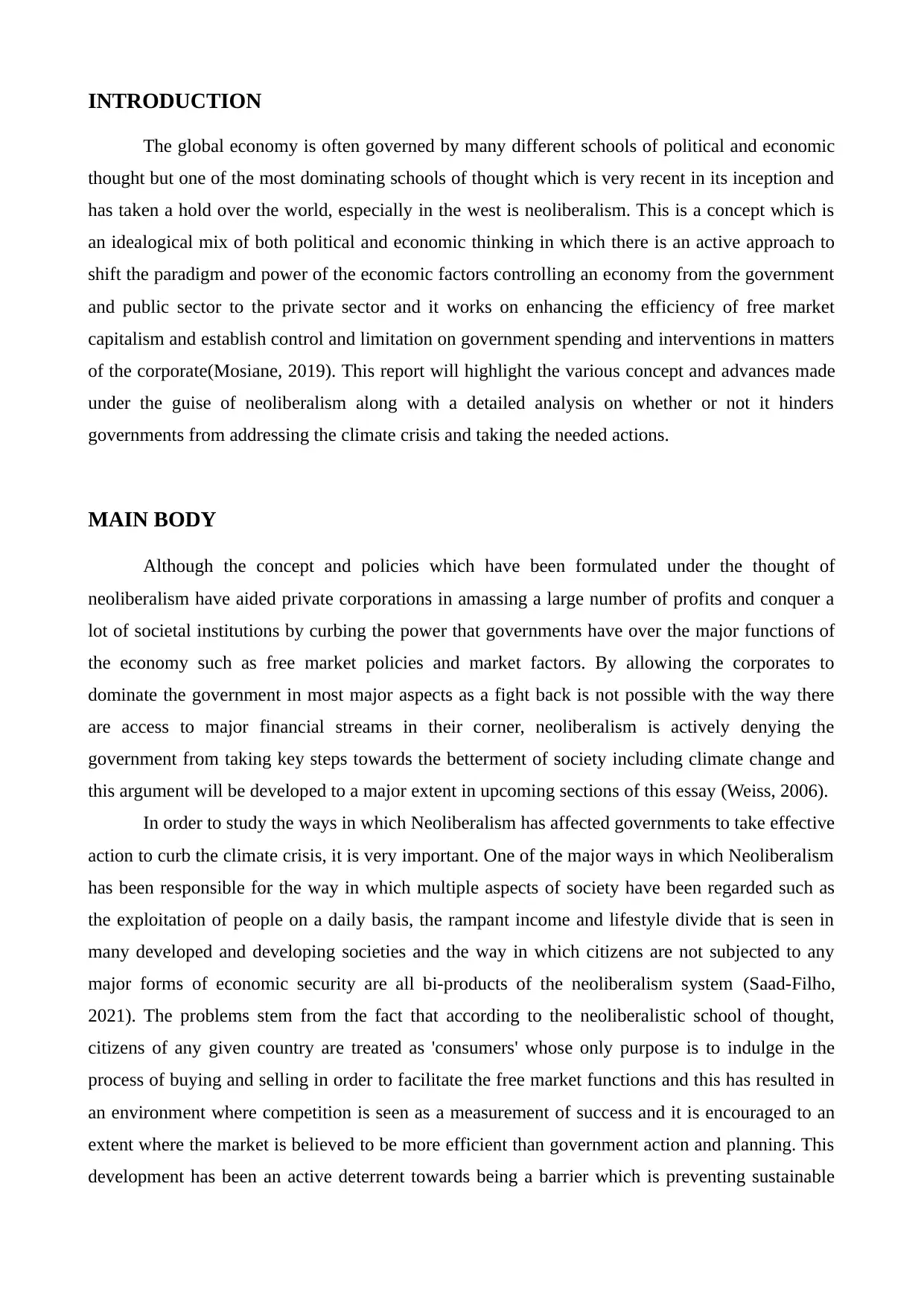
INTRODUCTION
The global economy is often governed by many different schools of political and economic
thought but one of the most dominating schools of thought which is very recent in its inception and
has taken a hold over the world, especially in the west is neoliberalism. This is a concept which is
an idealogical mix of both political and economic thinking in which there is an active approach to
shift the paradigm and power of the economic factors controlling an economy from the government
and public sector to the private sector and it works on enhancing the efficiency of free market
capitalism and establish control and limitation on government spending and interventions in matters
of the corporate(Mosiane, 2019). This report will highlight the various concept and advances made
under the guise of neoliberalism along with a detailed analysis on whether or not it hinders
governments from addressing the climate crisis and taking the needed actions.
MAIN BODY
Although the concept and policies which have been formulated under the thought of
neoliberalism have aided private corporations in amassing a large number of profits and conquer a
lot of societal institutions by curbing the power that governments have over the major functions of
the economy such as free market policies and market factors. By allowing the corporates to
dominate the government in most major aspects as a fight back is not possible with the way there
are access to major financial streams in their corner, neoliberalism is actively denying the
government from taking key steps towards the betterment of society including climate change and
this argument will be developed to a major extent in upcoming sections of this essay (Weiss, 2006).
In order to study the ways in which Neoliberalism has affected governments to take effective
action to curb the climate crisis, it is very important. One of the major ways in which Neoliberalism
has been responsible for the way in which multiple aspects of society have been regarded such as
the exploitation of people on a daily basis, the rampant income and lifestyle divide that is seen in
many developed and developing societies and the way in which citizens are not subjected to any
major forms of economic security are all bi-products of the neoliberalism system (Saad-Filho,
2021). The problems stem from the fact that according to the neoliberalistic school of thought,
citizens of any given country are treated as 'consumers' whose only purpose is to indulge in the
process of buying and selling in order to facilitate the free market functions and this has resulted in
an environment where competition is seen as a measurement of success and it is encouraged to an
extent where the market is believed to be more efficient than government action and planning. This
development has been an active deterrent towards being a barrier which is preventing sustainable
The global economy is often governed by many different schools of political and economic
thought but one of the most dominating schools of thought which is very recent in its inception and
has taken a hold over the world, especially in the west is neoliberalism. This is a concept which is
an idealogical mix of both political and economic thinking in which there is an active approach to
shift the paradigm and power of the economic factors controlling an economy from the government
and public sector to the private sector and it works on enhancing the efficiency of free market
capitalism and establish control and limitation on government spending and interventions in matters
of the corporate(Mosiane, 2019). This report will highlight the various concept and advances made
under the guise of neoliberalism along with a detailed analysis on whether or not it hinders
governments from addressing the climate crisis and taking the needed actions.
MAIN BODY
Although the concept and policies which have been formulated under the thought of
neoliberalism have aided private corporations in amassing a large number of profits and conquer a
lot of societal institutions by curbing the power that governments have over the major functions of
the economy such as free market policies and market factors. By allowing the corporates to
dominate the government in most major aspects as a fight back is not possible with the way there
are access to major financial streams in their corner, neoliberalism is actively denying the
government from taking key steps towards the betterment of society including climate change and
this argument will be developed to a major extent in upcoming sections of this essay (Weiss, 2006).
In order to study the ways in which Neoliberalism has affected governments to take effective
action to curb the climate crisis, it is very important. One of the major ways in which Neoliberalism
has been responsible for the way in which multiple aspects of society have been regarded such as
the exploitation of people on a daily basis, the rampant income and lifestyle divide that is seen in
many developed and developing societies and the way in which citizens are not subjected to any
major forms of economic security are all bi-products of the neoliberalism system (Saad-Filho,
2021). The problems stem from the fact that according to the neoliberalistic school of thought,
citizens of any given country are treated as 'consumers' whose only purpose is to indulge in the
process of buying and selling in order to facilitate the free market functions and this has resulted in
an environment where competition is seen as a measurement of success and it is encouraged to an
extent where the market is believed to be more efficient than government action and planning. This
development has been an active deterrent towards being a barrier which is preventing sustainable
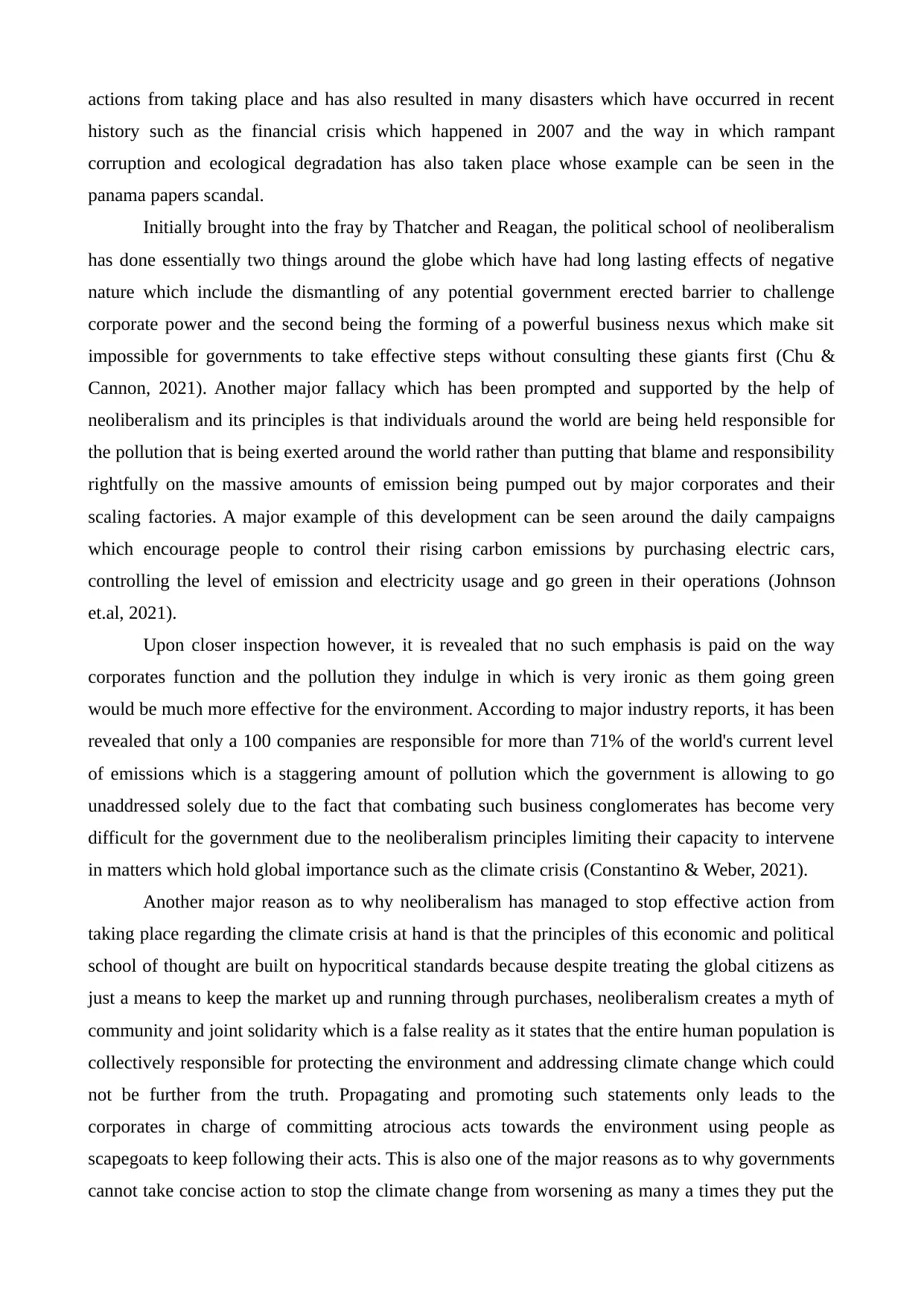
actions from taking place and has also resulted in many disasters which have occurred in recent
history such as the financial crisis which happened in 2007 and the way in which rampant
corruption and ecological degradation has also taken place whose example can be seen in the
panama papers scandal.
Initially brought into the fray by Thatcher and Reagan, the political school of neoliberalism
has done essentially two things around the globe which have had long lasting effects of negative
nature which include the dismantling of any potential government erected barrier to challenge
corporate power and the second being the forming of a powerful business nexus which make sit
impossible for governments to take effective steps without consulting these giants first (Chu &
Cannon, 2021). Another major fallacy which has been prompted and supported by the help of
neoliberalism and its principles is that individuals around the world are being held responsible for
the pollution that is being exerted around the world rather than putting that blame and responsibility
rightfully on the massive amounts of emission being pumped out by major corporates and their
scaling factories. A major example of this development can be seen around the daily campaigns
which encourage people to control their rising carbon emissions by purchasing electric cars,
controlling the level of emission and electricity usage and go green in their operations (Johnson
et.al, 2021).
Upon closer inspection however, it is revealed that no such emphasis is paid on the way
corporates function and the pollution they indulge in which is very ironic as them going green
would be much more effective for the environment. According to major industry reports, it has been
revealed that only a 100 companies are responsible for more than 71% of the world's current level
of emissions which is a staggering amount of pollution which the government is allowing to go
unaddressed solely due to the fact that combating such business conglomerates has become very
difficult for the government due to the neoliberalism principles limiting their capacity to intervene
in matters which hold global importance such as the climate crisis (Constantino & Weber, 2021).
Another major reason as to why neoliberalism has managed to stop effective action from
taking place regarding the climate crisis at hand is that the principles of this economic and political
school of thought are built on hypocritical standards because despite treating the global citizens as
just a means to keep the market up and running through purchases, neoliberalism creates a myth of
community and joint solidarity which is a false reality as it states that the entire human population is
collectively responsible for protecting the environment and addressing climate change which could
not be further from the truth. Propagating and promoting such statements only leads to the
corporates in charge of committing atrocious acts towards the environment using people as
scapegoats to keep following their acts. This is also one of the major reasons as to why governments
cannot take concise action to stop the climate change from worsening as many a times they put the
history such as the financial crisis which happened in 2007 and the way in which rampant
corruption and ecological degradation has also taken place whose example can be seen in the
panama papers scandal.
Initially brought into the fray by Thatcher and Reagan, the political school of neoliberalism
has done essentially two things around the globe which have had long lasting effects of negative
nature which include the dismantling of any potential government erected barrier to challenge
corporate power and the second being the forming of a powerful business nexus which make sit
impossible for governments to take effective steps without consulting these giants first (Chu &
Cannon, 2021). Another major fallacy which has been prompted and supported by the help of
neoliberalism and its principles is that individuals around the world are being held responsible for
the pollution that is being exerted around the world rather than putting that blame and responsibility
rightfully on the massive amounts of emission being pumped out by major corporates and their
scaling factories. A major example of this development can be seen around the daily campaigns
which encourage people to control their rising carbon emissions by purchasing electric cars,
controlling the level of emission and electricity usage and go green in their operations (Johnson
et.al, 2021).
Upon closer inspection however, it is revealed that no such emphasis is paid on the way
corporates function and the pollution they indulge in which is very ironic as them going green
would be much more effective for the environment. According to major industry reports, it has been
revealed that only a 100 companies are responsible for more than 71% of the world's current level
of emissions which is a staggering amount of pollution which the government is allowing to go
unaddressed solely due to the fact that combating such business conglomerates has become very
difficult for the government due to the neoliberalism principles limiting their capacity to intervene
in matters which hold global importance such as the climate crisis (Constantino & Weber, 2021).
Another major reason as to why neoliberalism has managed to stop effective action from
taking place regarding the climate crisis at hand is that the principles of this economic and political
school of thought are built on hypocritical standards because despite treating the global citizens as
just a means to keep the market up and running through purchases, neoliberalism creates a myth of
community and joint solidarity which is a false reality as it states that the entire human population is
collectively responsible for protecting the environment and addressing climate change which could
not be further from the truth. Propagating and promoting such statements only leads to the
corporates in charge of committing atrocious acts towards the environment using people as
scapegoats to keep following their acts. This is also one of the major reasons as to why governments
cannot take concise action to stop the climate change from worsening as many a times they put the
Secure Best Marks with AI Grader
Need help grading? Try our AI Grader for instant feedback on your assignments.
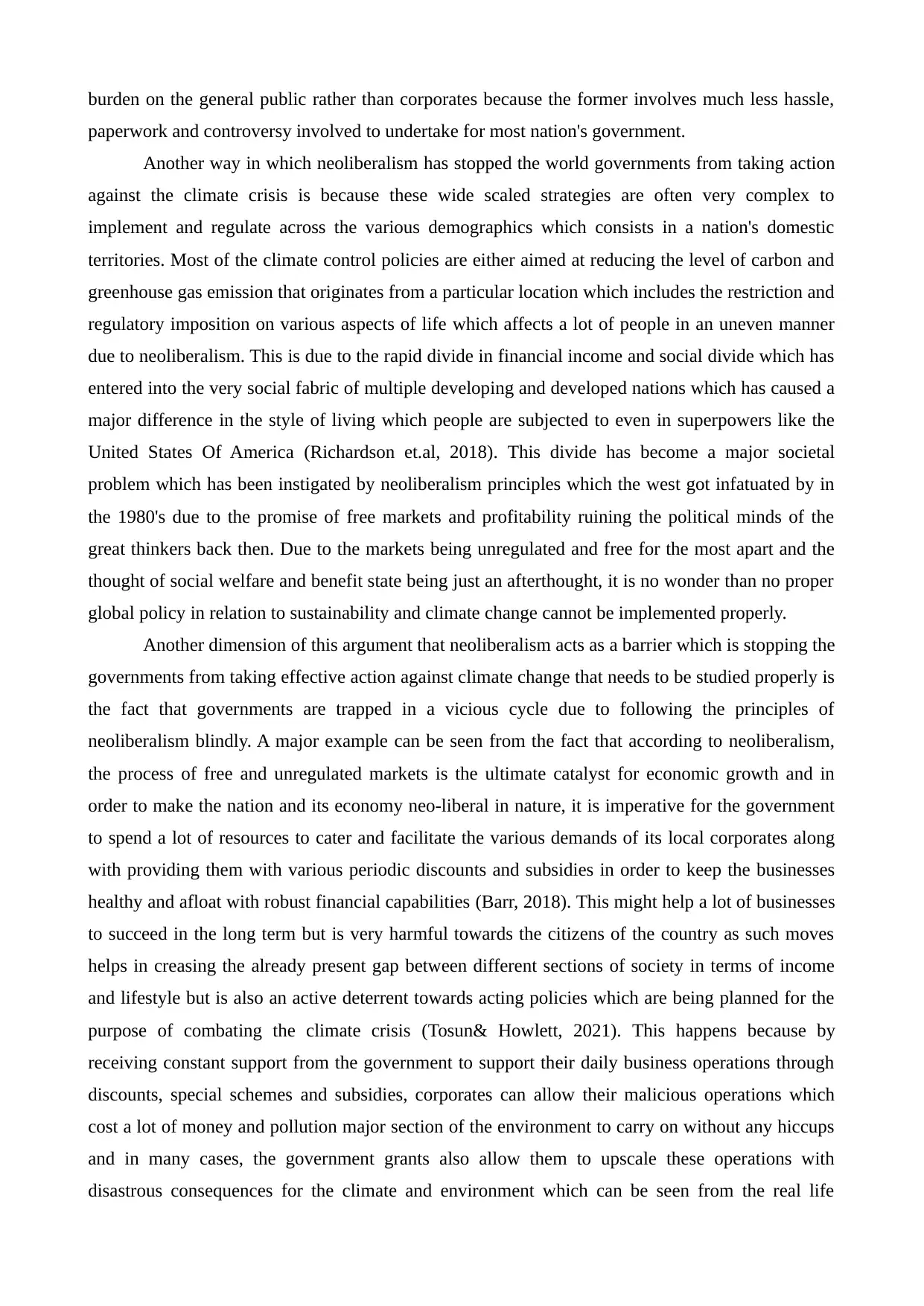
burden on the general public rather than corporates because the former involves much less hassle,
paperwork and controversy involved to undertake for most nation's government.
Another way in which neoliberalism has stopped the world governments from taking action
against the climate crisis is because these wide scaled strategies are often very complex to
implement and regulate across the various demographics which consists in a nation's domestic
territories. Most of the climate control policies are either aimed at reducing the level of carbon and
greenhouse gas emission that originates from a particular location which includes the restriction and
regulatory imposition on various aspects of life which affects a lot of people in an uneven manner
due to neoliberalism. This is due to the rapid divide in financial income and social divide which has
entered into the very social fabric of multiple developing and developed nations which has caused a
major difference in the style of living which people are subjected to even in superpowers like the
United States Of America (Richardson et.al, 2018). This divide has become a major societal
problem which has been instigated by neoliberalism principles which the west got infatuated by in
the 1980's due to the promise of free markets and profitability ruining the political minds of the
great thinkers back then. Due to the markets being unregulated and free for the most apart and the
thought of social welfare and benefit state being just an afterthought, it is no wonder than no proper
global policy in relation to sustainability and climate change cannot be implemented properly.
Another dimension of this argument that neoliberalism acts as a barrier which is stopping the
governments from taking effective action against climate change that needs to be studied properly is
the fact that governments are trapped in a vicious cycle due to following the principles of
neoliberalism blindly. A major example can be seen from the fact that according to neoliberalism,
the process of free and unregulated markets is the ultimate catalyst for economic growth and in
order to make the nation and its economy neo-liberal in nature, it is imperative for the government
to spend a lot of resources to cater and facilitate the various demands of its local corporates along
with providing them with various periodic discounts and subsidies in order to keep the businesses
healthy and afloat with robust financial capabilities (Barr, 2018). This might help a lot of businesses
to succeed in the long term but is very harmful towards the citizens of the country as such moves
helps in creasing the already present gap between different sections of society in terms of income
and lifestyle but is also an active deterrent towards acting policies which are being planned for the
purpose of combating the climate crisis (Tosun& Howlett, 2021). This happens because by
receiving constant support from the government to support their daily business operations through
discounts, special schemes and subsidies, corporates can allow their malicious operations which
cost a lot of money and pollution major section of the environment to carry on without any hiccups
and in many cases, the government grants also allow them to upscale these operations with
disastrous consequences for the climate and environment which can be seen from the real life
paperwork and controversy involved to undertake for most nation's government.
Another way in which neoliberalism has stopped the world governments from taking action
against the climate crisis is because these wide scaled strategies are often very complex to
implement and regulate across the various demographics which consists in a nation's domestic
territories. Most of the climate control policies are either aimed at reducing the level of carbon and
greenhouse gas emission that originates from a particular location which includes the restriction and
regulatory imposition on various aspects of life which affects a lot of people in an uneven manner
due to neoliberalism. This is due to the rapid divide in financial income and social divide which has
entered into the very social fabric of multiple developing and developed nations which has caused a
major difference in the style of living which people are subjected to even in superpowers like the
United States Of America (Richardson et.al, 2018). This divide has become a major societal
problem which has been instigated by neoliberalism principles which the west got infatuated by in
the 1980's due to the promise of free markets and profitability ruining the political minds of the
great thinkers back then. Due to the markets being unregulated and free for the most apart and the
thought of social welfare and benefit state being just an afterthought, it is no wonder than no proper
global policy in relation to sustainability and climate change cannot be implemented properly.
Another dimension of this argument that neoliberalism acts as a barrier which is stopping the
governments from taking effective action against climate change that needs to be studied properly is
the fact that governments are trapped in a vicious cycle due to following the principles of
neoliberalism blindly. A major example can be seen from the fact that according to neoliberalism,
the process of free and unregulated markets is the ultimate catalyst for economic growth and in
order to make the nation and its economy neo-liberal in nature, it is imperative for the government
to spend a lot of resources to cater and facilitate the various demands of its local corporates along
with providing them with various periodic discounts and subsidies in order to keep the businesses
healthy and afloat with robust financial capabilities (Barr, 2018). This might help a lot of businesses
to succeed in the long term but is very harmful towards the citizens of the country as such moves
helps in creasing the already present gap between different sections of society in terms of income
and lifestyle but is also an active deterrent towards acting policies which are being planned for the
purpose of combating the climate crisis (Tosun& Howlett, 2021). This happens because by
receiving constant support from the government to support their daily business operations through
discounts, special schemes and subsidies, corporates can allow their malicious operations which
cost a lot of money and pollution major section of the environment to carry on without any hiccups
and in many cases, the government grants also allow them to upscale these operations with
disastrous consequences for the climate and environment which can be seen from the real life
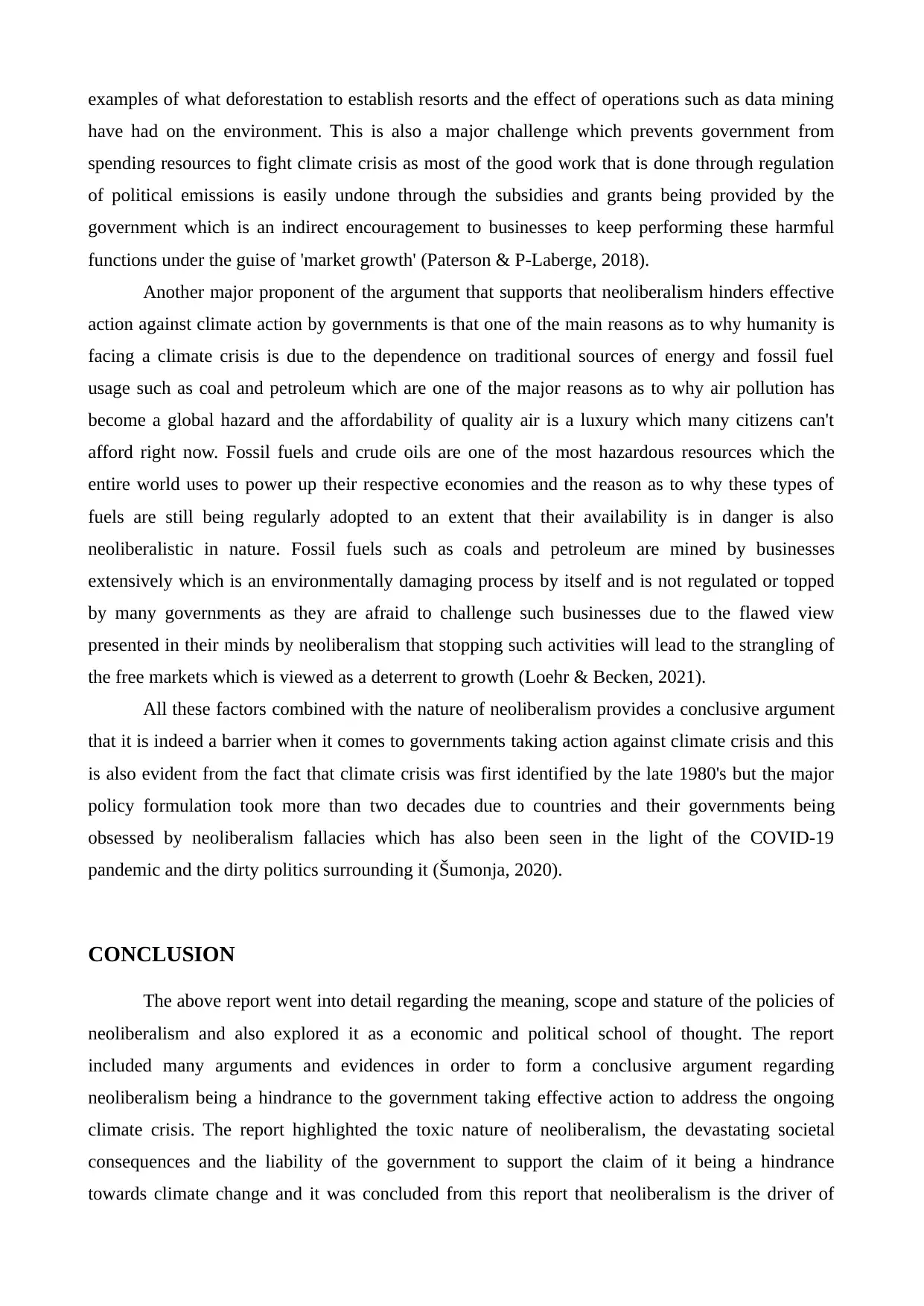
examples of what deforestation to establish resorts and the effect of operations such as data mining
have had on the environment. This is also a major challenge which prevents government from
spending resources to fight climate crisis as most of the good work that is done through regulation
of political emissions is easily undone through the subsidies and grants being provided by the
government which is an indirect encouragement to businesses to keep performing these harmful
functions under the guise of 'market growth' (Paterson & P‐Laberge, 2018).
Another major proponent of the argument that supports that neoliberalism hinders effective
action against climate action by governments is that one of the main reasons as to why humanity is
facing a climate crisis is due to the dependence on traditional sources of energy and fossil fuel
usage such as coal and petroleum which are one of the major reasons as to why air pollution has
become a global hazard and the affordability of quality air is a luxury which many citizens can't
afford right now. Fossil fuels and crude oils are one of the most hazardous resources which the
entire world uses to power up their respective economies and the reason as to why these types of
fuels are still being regularly adopted to an extent that their availability is in danger is also
neoliberalistic in nature. Fossil fuels such as coals and petroleum are mined by businesses
extensively which is an environmentally damaging process by itself and is not regulated or topped
by many governments as they are afraid to challenge such businesses due to the flawed view
presented in their minds by neoliberalism that stopping such activities will lead to the strangling of
the free markets which is viewed as a deterrent to growth (Loehr & Becken, 2021).
All these factors combined with the nature of neoliberalism provides a conclusive argument
that it is indeed a barrier when it comes to governments taking action against climate crisis and this
is also evident from the fact that climate crisis was first identified by the late 1980's but the major
policy formulation took more than two decades due to countries and their governments being
obsessed by neoliberalism fallacies which has also been seen in the light of the COVID-19
pandemic and the dirty politics surrounding it (Šumonja, 2020).
CONCLUSION
The above report went into detail regarding the meaning, scope and stature of the policies of
neoliberalism and also explored it as a economic and political school of thought. The report
included many arguments and evidences in order to form a conclusive argument regarding
neoliberalism being a hindrance to the government taking effective action to address the ongoing
climate crisis. The report highlighted the toxic nature of neoliberalism, the devastating societal
consequences and the liability of the government to support the claim of it being a hindrance
towards climate change and it was concluded from this report that neoliberalism is the driver of
have had on the environment. This is also a major challenge which prevents government from
spending resources to fight climate crisis as most of the good work that is done through regulation
of political emissions is easily undone through the subsidies and grants being provided by the
government which is an indirect encouragement to businesses to keep performing these harmful
functions under the guise of 'market growth' (Paterson & P‐Laberge, 2018).
Another major proponent of the argument that supports that neoliberalism hinders effective
action against climate action by governments is that one of the main reasons as to why humanity is
facing a climate crisis is due to the dependence on traditional sources of energy and fossil fuel
usage such as coal and petroleum which are one of the major reasons as to why air pollution has
become a global hazard and the affordability of quality air is a luxury which many citizens can't
afford right now. Fossil fuels and crude oils are one of the most hazardous resources which the
entire world uses to power up their respective economies and the reason as to why these types of
fuels are still being regularly adopted to an extent that their availability is in danger is also
neoliberalistic in nature. Fossil fuels such as coals and petroleum are mined by businesses
extensively which is an environmentally damaging process by itself and is not regulated or topped
by many governments as they are afraid to challenge such businesses due to the flawed view
presented in their minds by neoliberalism that stopping such activities will lead to the strangling of
the free markets which is viewed as a deterrent to growth (Loehr & Becken, 2021).
All these factors combined with the nature of neoliberalism provides a conclusive argument
that it is indeed a barrier when it comes to governments taking action against climate crisis and this
is also evident from the fact that climate crisis was first identified by the late 1980's but the major
policy formulation took more than two decades due to countries and their governments being
obsessed by neoliberalism fallacies which has also been seen in the light of the COVID-19
pandemic and the dirty politics surrounding it (Šumonja, 2020).
CONCLUSION
The above report went into detail regarding the meaning, scope and stature of the policies of
neoliberalism and also explored it as a economic and political school of thought. The report
included many arguments and evidences in order to form a conclusive argument regarding
neoliberalism being a hindrance to the government taking effective action to address the ongoing
climate crisis. The report highlighted the toxic nature of neoliberalism, the devastating societal
consequences and the liability of the government to support the claim of it being a hindrance
towards climate change and it was concluded from this report that neoliberalism is the driver of
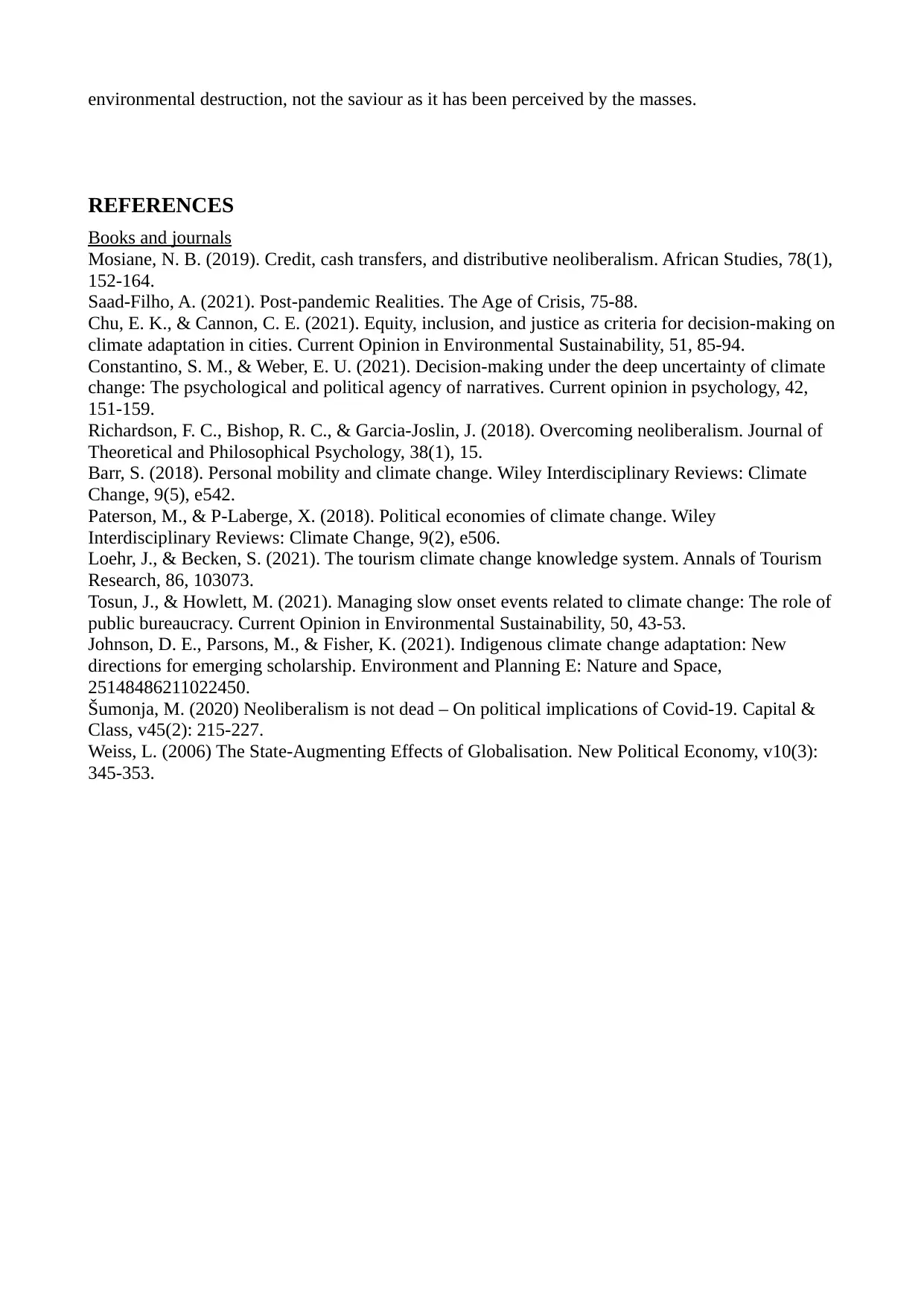
environmental destruction, not the saviour as it has been perceived by the masses.
REFERENCES
Books and journals
Mosiane, N. B. (2019). Credit, cash transfers, and distributive neoliberalism. African Studies, 78(1),
152-164.
Saad-Filho, A. (2021). Post-pandemic Realities. The Age of Crisis, 75-88.
Chu, E. K., & Cannon, C. E. (2021). Equity, inclusion, and justice as criteria for decision-making on
climate adaptation in cities. Current Opinion in Environmental Sustainability, 51, 85-94.
Constantino, S. M., & Weber, E. U. (2021). Decision-making under the deep uncertainty of climate
change: The psychological and political agency of narratives. Current opinion in psychology, 42,
151-159.
Richardson, F. C., Bishop, R. C., & Garcia-Joslin, J. (2018). Overcoming neoliberalism. Journal of
Theoretical and Philosophical Psychology, 38(1), 15.
Barr, S. (2018). Personal mobility and climate change. Wiley Interdisciplinary Reviews: Climate
Change, 9(5), e542.
Paterson, M., & P‐Laberge, X. (2018). Political economies of climate change. Wiley
Interdisciplinary Reviews: Climate Change, 9(2), e506.
Loehr, J., & Becken, S. (2021). The tourism climate change knowledge system. Annals of Tourism
Research, 86, 103073.
Tosun, J., & Howlett, M. (2021). Managing slow onset events related to climate change: The role of
public bureaucracy. Current Opinion in Environmental Sustainability, 50, 43-53.
Johnson, D. E., Parsons, M., & Fisher, K. (2021). Indigenous climate change adaptation: New
directions for emerging scholarship. Environment and Planning E: Nature and Space,
25148486211022450.
Šumonja, M. (2020) Neoliberalism is not dead – On political implications of Covid-19. Capital &
Class, v45(2): 215-227.
Weiss, L. (2006) The State-Augmenting Effects of Globalisation. New Political Economy, v10(3):
345-353.
REFERENCES
Books and journals
Mosiane, N. B. (2019). Credit, cash transfers, and distributive neoliberalism. African Studies, 78(1),
152-164.
Saad-Filho, A. (2021). Post-pandemic Realities. The Age of Crisis, 75-88.
Chu, E. K., & Cannon, C. E. (2021). Equity, inclusion, and justice as criteria for decision-making on
climate adaptation in cities. Current Opinion in Environmental Sustainability, 51, 85-94.
Constantino, S. M., & Weber, E. U. (2021). Decision-making under the deep uncertainty of climate
change: The psychological and political agency of narratives. Current opinion in psychology, 42,
151-159.
Richardson, F. C., Bishop, R. C., & Garcia-Joslin, J. (2018). Overcoming neoliberalism. Journal of
Theoretical and Philosophical Psychology, 38(1), 15.
Barr, S. (2018). Personal mobility and climate change. Wiley Interdisciplinary Reviews: Climate
Change, 9(5), e542.
Paterson, M., & P‐Laberge, X. (2018). Political economies of climate change. Wiley
Interdisciplinary Reviews: Climate Change, 9(2), e506.
Loehr, J., & Becken, S. (2021). The tourism climate change knowledge system. Annals of Tourism
Research, 86, 103073.
Tosun, J., & Howlett, M. (2021). Managing slow onset events related to climate change: The role of
public bureaucracy. Current Opinion in Environmental Sustainability, 50, 43-53.
Johnson, D. E., Parsons, M., & Fisher, K. (2021). Indigenous climate change adaptation: New
directions for emerging scholarship. Environment and Planning E: Nature and Space,
25148486211022450.
Šumonja, M. (2020) Neoliberalism is not dead – On political implications of Covid-19. Capital &
Class, v45(2): 215-227.
Weiss, L. (2006) The State-Augmenting Effects of Globalisation. New Political Economy, v10(3):
345-353.
1 out of 7
Related Documents
Your All-in-One AI-Powered Toolkit for Academic Success.
+13062052269
info@desklib.com
Available 24*7 on WhatsApp / Email
![[object Object]](/_next/static/media/star-bottom.7253800d.svg)
Unlock your academic potential
© 2024 | Zucol Services PVT LTD | All rights reserved.





